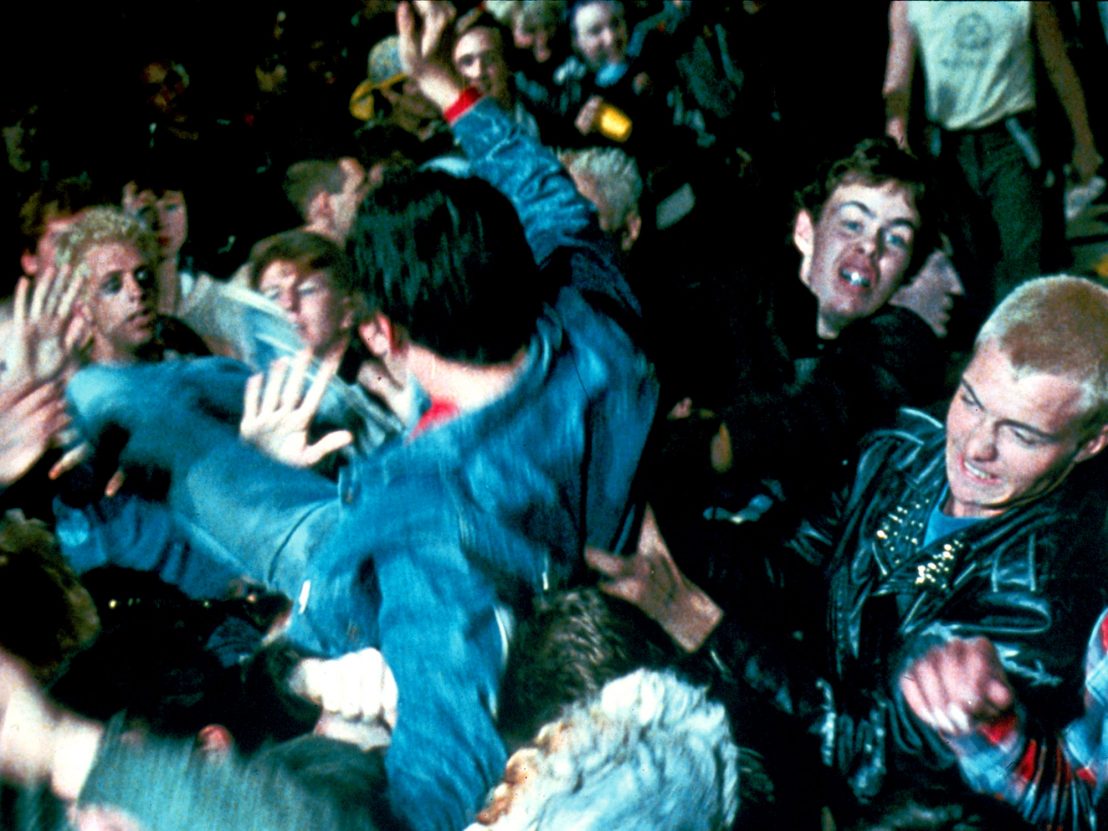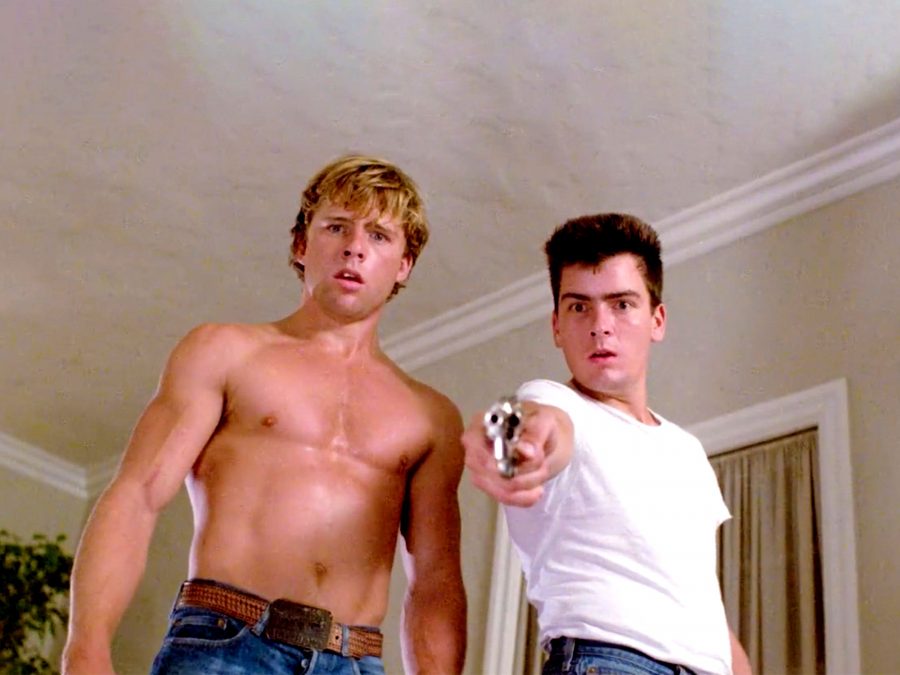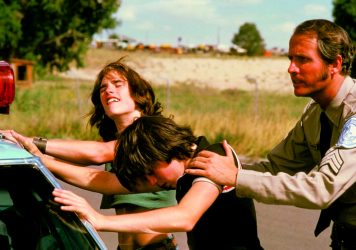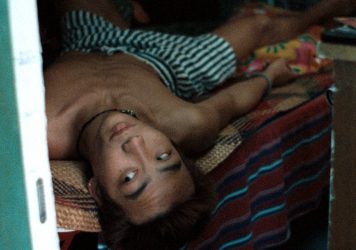
“May 10th, 1968. Mark and I are going to be very happy here. The air is clean, skies are blue, and all the houses are brand new and beautiful. They call it suburbia and that word’s perfect because it’s a combination of suburb and utopia… I’m sure with Mark’s job at Lockheed I’ll never have to work again… Oh and by the way, diary, we want to have a child soon. Suburbia’s a great place for children…”
These words come from the diary of Tina Johnson (Donna Lamana), expressing all the hopes and optimism of her youth in the late ’60s. But now, in the ’80s, her teenaged son Evan (Bill Coyne) reads the old diary with the cruel benefit of hindsight. His father Mark is long gone, and Tina, now a single mother to Evan and his much younger brother Ethan (Andrew Pece), works all day, drinks all night, and interacts with her eldest by throwing bottles at his head.
So Evan has left home, and joined Jack Diddley (Chris Pedersen) and a coterie of other young punks in a squat on the neighbourhood’s outer limits. As Evan and Jack drive through that same suburbia which Tina had been describing, and which now looks the worse for wear, Jack comments, “They didn’t realise they’d be the slums of the future.”
Penelope Spheeris is perhaps best known for directing SNL comedy spin-off Wayne’s World in 1992. But she had for the previous decade been a chronicler of LA’s underground scenes in her The Decline of Western Civilisation documentary trilogy, and in her early features. Her debut Suburbia serves as the low-rent downside to John Hughes’ more sanitised vision of ’80s youth culture. For here Reagan’s America is seen as a place of lay-offs, layabouts and general decay. All the kids in the squat – literally branded with the initials TR (for ‘The Rejected’) – come from broken homes, and are forming their own unruly family together on the edge not just of town but of all their decade’s ideological bromides.
These young people are unambiguously delinquents – vandalising property, getting into fights, stealing whatever they can. But in a film of uneasy juxtapositions and symmetries, they are also shown to be a product of the very environments from which they have emerged and grown marginalised. Suburbia opens with the shocking spectacle of a toddler being attacked and killed by a wild dog. These dogs, abandoned by their owners, are rumoured to have interbred with local coyotes, and now prowl near the squat.
One of the gang, Razzle (played by Flea of the Red Hot Chilli Peppers), who keeps a pet rat, is also trying to domesticate a pair of the dogs. The dogs serve as an obvious analogue for the kids, themselves condemned by others as “wild teenagers” and “metal rejects running wild on the streets”, and themselves forming a domestic pack together in response to their own rejection and abandonment.
If the members of TR are often seen throwing bottles, we first saw a bottle similarly used as a projectile by Evan’s mother. If an attempt by TR member Skinner (Timothy Eric O’Brien) to chat up a girl in a club ends with her being stripped of her dress and publicly humiliated by the male audience (“You guys have minds this big,” declares the band’s frontman in disgust), later Skinner’s friend Sheila (Jennifer Clay) will have her nightdress torn off by supposedly law-abiding citizens Jim Triplett (Lee Frederick) and Bob Skokes (Jeff Prettyman), who have taken it upon themselves to break into the squat at night and terrorise the young residents, in the same way that this adult pair hunts and shoots the wild dogs.
Upon hearing that a girl was found dead at the squat, Jim and Bob plot their indignant revenge against TR, even as these two married men’s moral outrage is offset and ironised by the fact that they are in a strip club when they make their plan, and by our knowledge that the girl in question is Sheila, driven to suicide after the same men’s earlier assault on her proved the last straw. Sheila’s father (J Dinan Myrtetus) too, in his tie and suit, may assert his superiority over her unkempt friends at the funeral service, but as a man who molested, beat and permanently scarred his own daughter, he wears his respectability thinly.
It is this hypocrisy in the adults around them that TR shun and resist, and that Spheeris’ film exposes in an intergenerational dialectic reminiscent of Jonathan Kaplan’s Over the Edge. The screenplay here is never two-dimensional. Near the beginning, Jack tells Evan about how his father was killed in Vietnam, and his new stepfather is a cop, before adding: “That’s not the worst of it, though – he’s black.”
It is a jaw-droppingly casual piece of racism, which even Evan, our cicerone through this suburban netherworld, seems to endorse with the response,”God, what a drag!” Yet later we will meet Jack’s much maligned black cop stepdad Officer Bill Rennard (Don Allen), who will turn out to be the most decent character in the entire film, and the only adult who extends any respect or sympathy to these runaway adolescents – even as they show him little but contempt.
Suburbia ends as it begins – with the death of a child – and so, even if it captures spirited live performances by the likes of DI, TSOL and The Vandals along the way, these are framed by bleak scenes of a community violently bereft of its future. Here punk is not just an attitude, or a kind of music, but two despairing fingers held up to a callous, fragmenting society whose once sunny dreams have long since fallen into hostility, alienation and dystopian darkness.

Released two years later, Spheeris’ follow-up The Boys Next Door is even bleaker. Its theme is established from the start – a montage of recent young male serial murderers ripped from the headlines, with commentary from horrified pundits and the killers themselves. This introduction evokes Sheldon Renan and Leonard Shrader’s mondo documentary The Killing of America, but the narrative which follows is a fiction, tracking a pair of high-school graduates as they go on a violent spree one weekend, and presenting them in a contradictory light of empathy and abhorrence.
It is clear, on their last day at school, that there is something off about Roy Alston (Maxwell Caulfield) and Bo Richards (Charlie Sheen). Prefiguring Beavis and Butt-Head by seven years, they are a duo of dumb, sniggering misfits whose only friends are each other and whose weird, sexist, unpleasant jokes are amusing only to themselves.
Pariahs among their peers, they have to crash the graduation party to which everyone else has been invited. And while their preppy fellow pupils are all headed to college, working-class Roy and Bo know that the following Monday they will be starting local factory jobs that will trap them for the rest of their lives. Much like Roy’s factory-working father, who is so uncommunicative, so oblivious of his son and so absent even in his own trailer home, that Roy has to supply his dad’s lines himself while engaging in imaginary conversations with him that are strictly one-way.
Overlooked and unloved, Roy is always angry. “I’ve got stuff inside me,” he confides in Bo. He even contemplates joining the Marines, imagining that a state sanction to kill people might help him work some of the aggression out of his system.
Bo too has stuff inside him. Where Roy is filled with rage, Bo is extremely randy. Yet rejected sexually as well as socially, he is wondering whether he will ever be able to turn all his boastful fantasies to reality. With $200 in their pockets – a graduation gift from Bo’s grandfather – the two delinquents head off in Roy’s Plymouth Roadrunner to Los Angeles, where Ray starts randomly beating, hospitalising and killing people, and Bo, far from stopping his friend, declares their LA jaunt ‘Caveman Day’, where they can “just be totally prehi-fucking-storic.”
This is to be their last hurrah to youthful dreams, a weekend of pernicious play before work and slow rot take over forever. Meanwhile LAPD Detectives Mark Woods (Christopher McDonald) and Ed Hanley (Hank Garrett) follow the trail of destruction, struggling to comprehend such senseless outrage – and are confronted with colleagues who harbour as much prejudice against the city’s harmless punk girls, BDSM ‘perverts’ and gay men as against bona fide homicidal delinquents.
Ray too hates “faggots”, even though it seems obvious that his feelings for Bo go beyond the merely homosocial. And so it appears that this angry young man with an uncanny knack of finding a gay bar, and of (repeatedly) parading himself shirtless before his friend, and of violently intervening (like a jealous lover) whenever a woman catches Bo’s eye, has become disaffected not just by his social marginalisation and troubled home life, but because of an unspoken desire – stuff inside him – that makes him deny and loathe himself as much as others.
It is a messy, dispiriting portrait of two rebels without a a cause who go off the rails as they come of age, leaving only suffering and death in their wake. The Boys Next Door keeps us with them all the way on their road to nowhere, getting us to hope, impossibly, that these errant boys, and we too, might learn something – anything – constructive from all this pointless, ruinous chaos.
It is easy to see the influence of these two films on the subsequent oeuvre of Gregg Araki, but Spheeris is a pioneer in limning (without judgment) the subcultures and countercultures of her own time and place, as well as all the angst, anomie and anarchy of adolescence. These films are dynamite, exploding the more mainstream image of cosily aspirational ’80s America, and finding a nihilistic blankness in the bedrock beneath.
Suburbia and The Boys Next Door are available on digital from 30 August and on separate Blu-rays from 6 September via 101 Films’ Black Label.
Published 1 Sep 2021

By Anton Bitel
The angst-ridden Over the Edge from 1979 was a major influence on Richard Linklater and Kurt Cobain.

By Anton Bitel
Director Fruit Chan’s 1997 indie Made in Hong Kong captures a group of characters – and a city – in transition.

This Keanu Reeves-starring drama is a poignant tale of teenage apathy.